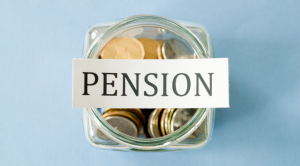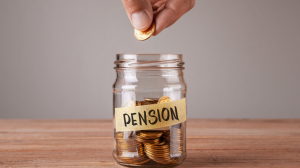Are you planning for retirement and looking for the best way to secure your future? Look no further than personal pensions. In this blog, we will dive into what exactly a personal pension is and how it works. We will also explore the different types of pensions available, including defined contribution, defined benefit pensions, and state pensions. But that’s not all! We will also discuss how to identify the best-performing pension funds and the benefits of investing in them. Whether you’re just starting to think about retirement or already have a pension in place, this blog will provide valuable insights and guidance on setting up a personal pension that suits your needs.
What is a Personal Pension?

A personal pension is a type of retirement savings plan that individuals can set up for themselves. It is designed to provide individuals with a source of income in their retirement years and any other pensions they may be entitled to. With a personal pension, individuals make regular contributions into their pension pot, which professional fund managers then invest.
The aim is for the investments to grow over time so that by the time the individual reaches retirement age, they have built up a substantial sum of money that can be used to provide them with an income during their retirement years. Personal pensions offer individuals flexibility and control over their pension savings, as they can choose how much to contribute and how the funds are invested. They also offer tax advantages, as the contributions made into a personal pension are eligible for tax relief.
How Does a Personal Pension Work?

When it comes to saving for retirement, a personal pension is one option that you may consider. But how does a personal pension work?
A personal pension is a long-term investment product you can use to save for retirement. You can make regular or lump sum contributions into your personal pension, and the money will then be invested in order to grow over time.
You can start withdrawing from your personal pension when you reach retirement age. The amount of money that you will be able to withdraw will depend on the size of your fund and the performance of the investments.
The government regulates personal pensions, so you can be sure that your money is safe and secure. Additionally, most personal pension providers offer a wide range of investment options, so you can choose how your money is invested based on your own risk tolerance and objectives.
If you’re looking for a way to save for retirement, a personal pension could be a good option for you. Be sure to research to find the best provider and investment strategy for your needs.
Identifying the Best Performing Pension Funds

The investment industry is awash with pension funds, and knowing which ones are the best performers can be difficult. However, a few key indicators can help you identify the best-performing pension funds.
One key indicator is fees. Many pension funds charge high fees, which can eat into your investment returns. Look for a fund with low fees, such as an index fund or exchange-traded fund (ETF).
Another key indicator is past performance. A fund’s historical performance is a good predictor of future performance. Look for a fund with a strong track record of outperforming its benchmark index.
Consider the risk level of the fund. Some pension funds take on more risk in pursuit of higher returns. If you’re retired or close to retirement, you may want to minimize risk by choosing a more conservative fund.
By considering these factors, you can narrow down your options and choose a pension fund that is likely to perform well in the future.
What are the Different Types of Pensions?

Several types of pensions are available, each offering its own set of benefits and features. Three common types of pensions include:
1. Defined Contribution Pension
A widely chosen pension plan in the UK is the defined contribution pension. This type of pension allows both the employer and employee to contribute a specific amount of money into an individual account. The funds in the account are then invested in a range of investment options such as stocks, bonds, and mutual funds.
The overall value of the pension fund will depend on the performance of these investments over time. When individuals reach retirement age, they can choose to withdraw money from their pension fund in the form of a lump sum or regular payments. It’s important to consider seeking advice from a financial adviser or pension provider to make informed investment decisions.
2. Defined Benefit Pension
A defined benefit pension, which is a type of pension plan, provides retirees with a fixed income during retirement. This income is determined by factors such as an employee’s salary and years of service and is guaranteed by the employer instead of the employee bearing the investment risk. Defined benefit pensions offer retirees financial security and a reliable source of income. The employer is responsible for funding the pension plan and managing the investments to ensure enough assets fulfill the promised benefits.
However, due to the cost associated with maintaining defined benefit pensions, many companies have shifted towards defined contribution plans like 401(k)s, which require employees to save for their own retirement.
3. State Pension
The state pension in the UK is a regular payment provided by the government to individuals who have reached a certain age. It is funded through National Insurance contributions made throughout a person’s working life. The amount someone receives is based on their National Insurance record, with a minimum number of qualifying years needed for the full pension. The state pension age is gradually increasing, aiming to reach 67 for both genders by 2028.
While the state pension offers a fundamental level of retirement income, individuals often opt to enhance it through additional private pensions or savings. Planning for retirement involves considering various investment options and seeking financial advice from professionals such as financial advisers or pension providers. With their expertise, individuals can explore different pension schemes, including workplace pensions, SIPPs (self-invested personal pensions), or annuities, to maximize their retirement savings and create a secure financial future.
Benefits of Investing in the Best Performing Pensions

Investing in the best-performing pensions can offer a range of benefits for individuals looking to secure their financial future. Firstly, these pensions have a track record of delivering strong returns over time, which means that your money has the potential to grow significantly. This can help you build a substantial retirement fund and provide you with a comfortable lifestyle in your golden years.
Additionally, investing in the best-performing pensions often comes with lower fees and charges, allowing you to maximize your returns and minimize costs. Furthermore, these pensions usually offer diverse investment options, giving you the flexibility to tailor your investment portfolio to your risk tolerance and investment goals. Overall, investing in the best-performing pensions can be a smart choice for individuals who want to grow their wealth and achieve long-term financial security.
Conclusion
Investing in the best-performing pension funds can provide you with financial security and stability in your retirement years. By carefully selecting the right pension fund, you can maximize your returns and ensure a comfortable future. Whether you’re considering a defined contribution pension, a defined benefit pension, or the state pension, it’s important to understand how each type works and what benefits they offer. Setting up a personal pension is a straightforward process that involves choosing a pension provider, determining your contribution amount, and selecting your investment options. By taking these steps and making informed decisions, you can set yourself up for a financially secure retirement. If you want to learn more about the different types of pensions and how to identify the best-performing funds, read our comprehensive guide on the topic. Start planning for your future today by making smart investment choices.









